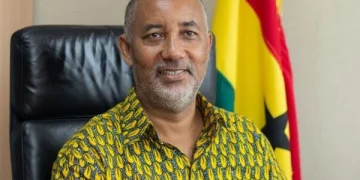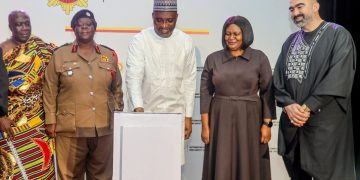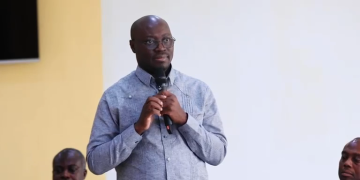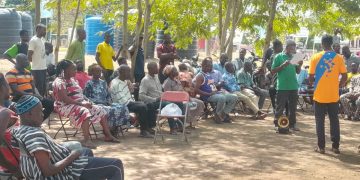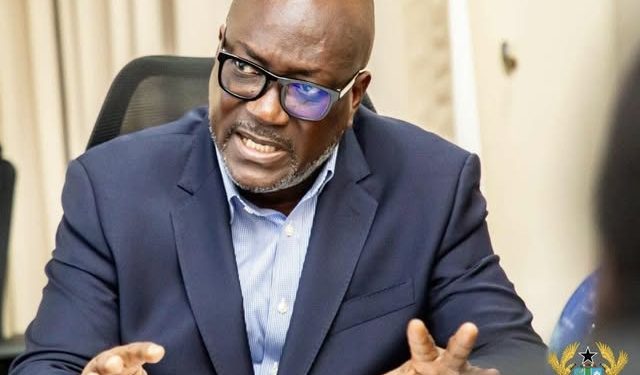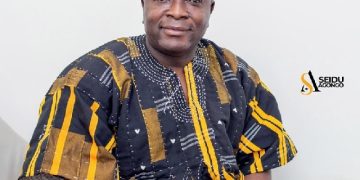A leading constitutional scholar has delivered a scathing rebuke of suggestions that Ghana’s Supreme Court could interpret presidential term limits to permit a third term, describing any such judicial ruling as “illegitimate and bogus” whilst accusing some in the legal profession of fostering dangerous interpretative overreach.
Kwasi Prempeh of the Centre for Democratic Development-Ghana, who also heads the Presidential Committee currently receiving and reviewing proposals to amend the 1992 Constitution, issued the stark warning following reports that former New Patriotic Party chairman Freddie Blay had somewhat expressed support for potential Supreme Court interpretation of Article 66 of the 1992 Constitution to allow President Mahama to seek a third term in office.
The controversy has intensified amid allegations from Parliamentary Minority Leader Alexander Afenyo-Markin that President Mahama’s recent nomination of seven Supreme Court justices represents a calculated strategy to facilitate constitutional interpretation for third-term ambitions.
Legal Framework for Constitutional Interpretation
Under Ghana’s constitutional jurisprudence, particularly Articles 2 and 130, constitutional interpretation may be sought in specific circumstances: where constitutional language is ambiguous or obscure; when rival interpretations exist; where conflicts arise between different constitutional articles; or when conflicts emerge in the operation of constitutional institutions.
However, Prempeh’s analysis appears to suggest that Article 66(2) fails to meet any of these established criteria for legitimate constitutional interpretation. The text contains no ambiguity requiring judicial clarification, no internal constitutional conflict necessitating resolution, and no operational confusion between institutions.
Article 66(2) of Ghana’s Constitution states: “A person shall not be elected to hold office as President of Ghana for more than two terms.” Prempeh argues this provision admits of only one meaning and provides no scope for judicial interpretation.
“There is nothing to interpret about the presidential term limit provision in the 1992 Constitution. None whatsoever,” Prempeh declared, attacking what he termed “Ghana-style modern purposive interpretation” for creating a legal culture where lawyers and judges appear to believe themselves unconstrained by clear constitutional text.
Prempeh’s critique targets fundamental principles of constitutional interpretation, arguing that judges lack authority to “rewrite or amend or set aside a provision of the Constitution whose text and purpose, including from the history, admit of only one meaning. Two terms means two terms!”
Comparative constitutional analysis
Prempeh’s argument gains force from internal constitutional comparison. Article 246(2) explicitly states that unless a “[District Chief Executive] resigns or dies or he earlier ceases to hold office under clause (3) of article 243 of this Constitution, [his] term of office … shall be four years; and a person shall not hold office as a District Chief Executive for more than two consecutive terms.” This provision, he argues, demonstrates that Ghana’s constitutional framers knew precisely how to include the word “consecutive” when they intended such limitation.
“If the Framers of Article 66(1) wanted to say that a President cannot be elected to office as President ‘for more than two consecutive terms,’ they would have said so, as they, in fact, said and knew to say in Article 246(2) of the same Constitution,” Prempeh observed. This textual analysis suggests that the omission of “consecutive” from the presidential term limits was deliberate, creating an absolute rather than temporal restriction on presidential service.
Political allegations and judicial independence
The constitutional debate has become entangled with allegations of court manipulation. Afenyo-Markin claimed that President Mahama’s nomination of seven Supreme Court justices represents “the first major attempt” at implementing a “third term agenda.”
“It is obvious that the bold attempts by the president to nominate, out of the blue, seven judges to the Supreme Court are the first major attempt at all that they have rehearsed—a third term agenda,” the Minority Leader alleged on 1 May 2025.
These accusations raise fundamental questions about the independence of Ghana’s highest court and the potential for political influence over constitutional interpretation. The timing of the nominations has fuelled speculation about strategic court composition ahead of potential constitutional challenges.
NPP leadership divergence
The controversy appears to have exposed divisions within opposition ranks. Whilst Afenyo-Markin condemns alleged court packing, former NPP chairman Freddie Blay adopted a markedly different stance, expressing comfort with potential Supreme Court interpretation.
“I don’t have a problem if the Supreme Court interprets the constitution to allow John Mahama to run for a third term,” Blay is reported to have stated in an interview with Kwasi Parker-Wilson of Oyerepa TV, creating apparent tension with his party’s official position as articulated by Afenyo-Markin. This divergence highlights broader uncertainty about constitutional interpretation and the role of the judiciary in resolving politically sensitive constitutional questions.
Judicial supremacy and constitutional limits
Prempeh’s intervention addresses fundamental questions about judicial power and constitutional interpretation. His assertion that “judges do not have authority to rewrite or amend or set aside” clear constitutional provisions challenges expansive interpretative doctrines that grant courts broad discretion.
“This matter must be laid to rest. The Supreme Court is not omnipotent,” Prempeh declared, advocating for judicial restraint in constitutional interpretation when textual meaning is clear.
The scholar’s critique of “Ghana-style modern purposive interpretation” suggests concern that unchecked flexible interpretative approaches have undermined constitutional certainty and democratic accountability.
The perception of constitutional manipulation threatens public confidence in both judicial independence and democratic institutions. Prempeh’s intervention appears designed to establish clear interpretative boundaries before potential legal challenges emerge.
Historical precedent and regional context
The term limits debate occurs against a backdrop of African leaders seeking to extend their tenure through constitutional manipulation. Recent examples across the continent have demonstrated how constitutional amendments and or judicial interpretation can facilitate tenure extension despite apparently clear constitutional restrictions.
In the US, a similar debate unfolded recently after President Donald Trump stated that he was “not joking” about wanting to serve a third, or even fourth, term as US president. Like Mahama, who lost his 2016 re-election bid for a second term, Trump’s attempt at a second term in 2020 failed when he was defeated by Joe Biden.
Following intense public outrage, Trump, 78, later clarified that his statements were meant to troll the “fake news media”.
“I’ll be an eight-year president, I’ll be a two-term president. I always thought that was very important,” Trump told NBC’s Meet the Press with Kristen Welker in an interview in May.
Ghana’s democratic credentials depend significantly on respect for constitutional term limits, making any perception of manipulation particularly damaging to institutional credibility.
Legal implications and future challenges
Should any legal challenge to the two-term limit reach the Supreme Court, Prempeh’s analysis provides a framework for textualist interpretation that would reject reinterpretation attempts. His emphasis on textual clarity and framers’ intent offers a methodological approach for judicial consideration.
The scholar’s critique of interpretative flexibility may influence judicial reasoning, particularly if justices wish to avoid accusations of political manipulation or constitutional overreach.
The constitutional controversy continues as Ghana grapples with fundamental questions about judicial power, democratic governance, and constitutional interpretation in a politically charged environment.
Source: Hard Law Journal | 11 June 2025


